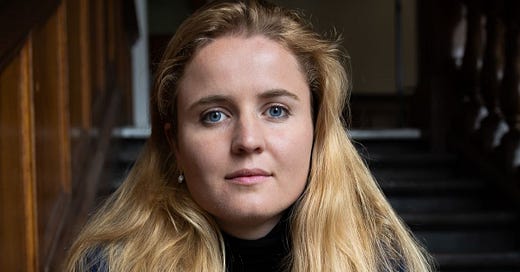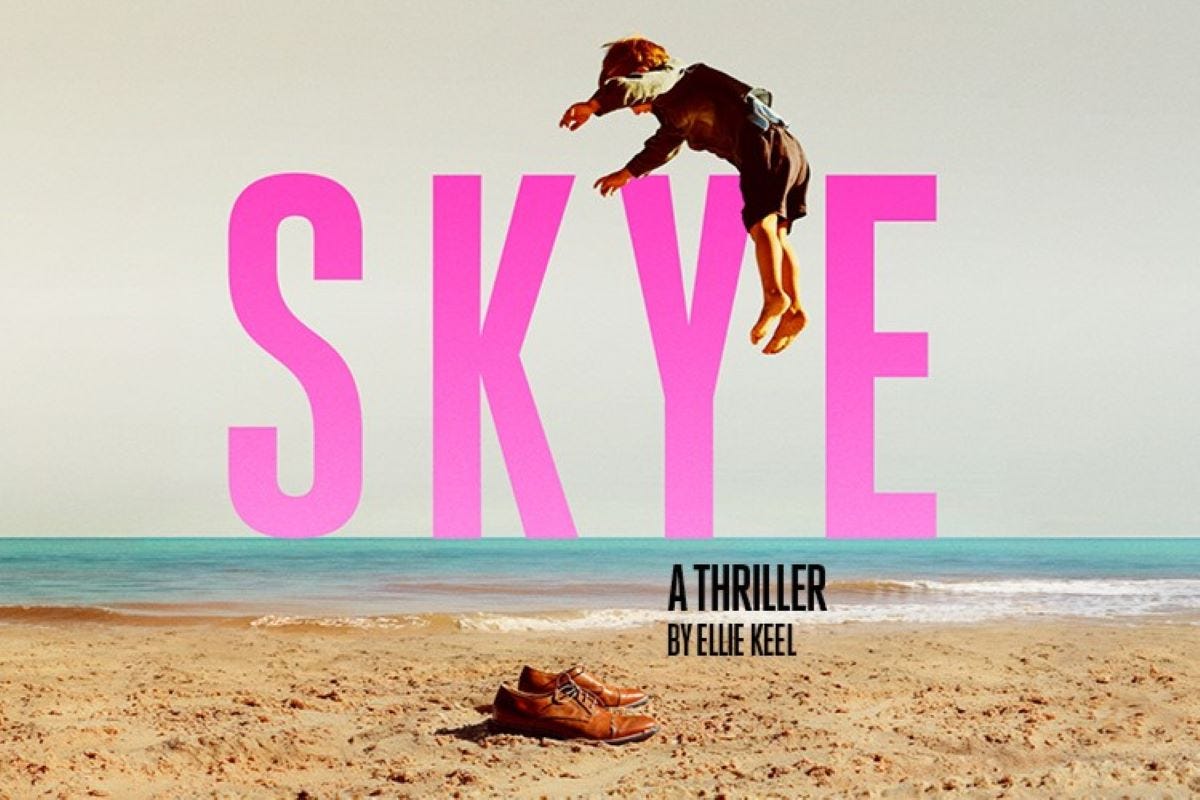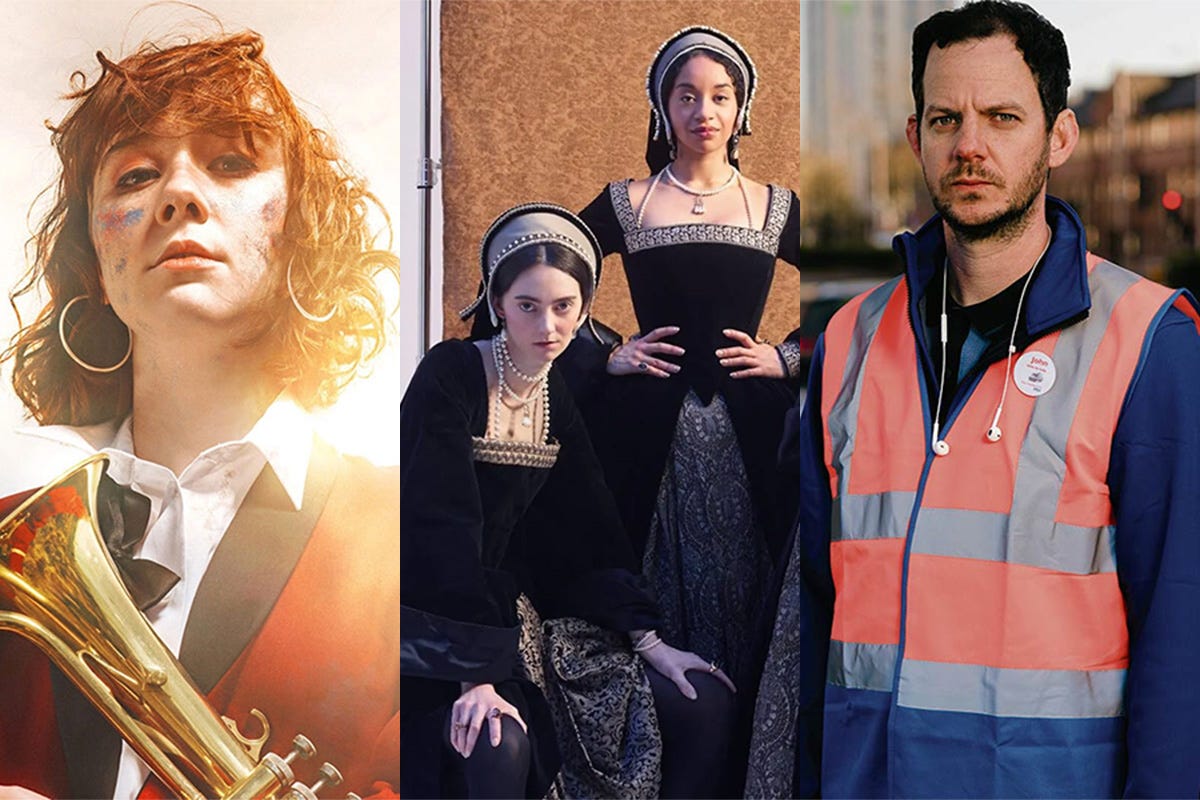"I am used to taking risks as a producer. I’m addicted to it, in fact."
Producer Ellie Keel on her debut play Skye: A Thriller, which will run at Summerhall during the Edinburgh Fringe. Plus: three shows to see next week.
Hello, and welcome to The Crush Bar, a newsletter about theatre by Fergus Morgan.
This is the free Friday issue, which usually contains an interview with an exciting theatremaker or an essay on a theatre-related topic. This week, it is a chat with producer Ellie Keel, whose debut play will be staged at Summerhall during this year’s Edinburgh Fringe. After that, there are your usual three show recommendations.
In case you missed it, here is this week’s issue of Shouts and Murmurs, which is a weekly round-up of the most interesting writing about theatre elsewhere…
You can get Shouts and Murmurs straight in your inbox every Tuesday - and help keep this newsletter going - by signing up as a paid supporter of The Crush Bar.
Theatres, companies, agencies and other organisations can also sign-up as champion supporters of The Crush Bar, which gets their name in this dedicated tab on The Crush Bar’s Substack homepage and in the footer of every Friday issue.
On Wednesday, Summerhall launched its Edinburgh Festival Fringe programme.
It features loads of exciting stuff, including Skye: A Thriller, the debut play from Ellie Keel, the producer behind several festival hits in previous years, including Rafaella Marcus’ Sap, Nathan Queeley-Dennis’ Bullring Techno Makeout Jamz, Jamie Armitage’s An Interrogation, Mary Higgins and Ell Potter’s The Last Show Before We Die, and Daisy Hall’s Bellringers, all of which transferred elsewhere after their Edinburgh stints.
Born in Kent in 1991, Keel got heavily involved with student theatre at the University of Oxford, then started producing professionally after graduating. In 2019, she co-founded the Women’s Prize for Playwriting with Paines Plough - submissions just closed for this year’s £20,000 prize - and in 2024 she was the youngest ever winner of The Stage’s Producer Of The Year Award. Skye: A Thriller is not Keel’s first foray into creative writing: her first novel, The Four, was published by HQ last year and quickly became a Sunday Times bestseller. Her second, as yet untitled, is due in 2026.
You have been a producer for a decade. Now, you have written your first play. Why?
Why not? I was already co-producing a show at this year’ Edinburgh Fringe with Paines Plough – Ed Edwards’ brilliant Ordinary Decent Criminal – and I wanted something to pair with it. I’d had this nagging idea for a play for quite a long time, and I thought: ‘I’m just going to sit down, start writing it and see what happens.’
It is called Skye: A Thriller. What is it about?
It is about four siblings who move to Edinburgh after the death of their father. They go on holiday to Skye every year. One year, they are on a beach there, and the youngest sees their father in the distance. The play follows their pursuit of this man – or this being, or whatever it is – around the island, some of them in the belief that it is him, some of them in the belief that it is not. It is about grief, and ghosts and sibling relationships and families and the delusions we live with.
How is it structured? Is it a one-person play?
Maybe. Maybe not. I’m trying not to give spoilers here. Matthew Byam Shaw once said to me: ‘The thing with thrillers is that you only get one chance.’ I think he meant that you cannot regain the suspense and tension once it is lost, so I am being very cautious about giving anything away. At the moment, it is still a work in progress. It will evolve right up until it is locked in for the press performance.
Lyndsey Turner has spoken about loving plays that you can describe as ‘and then this happens, and then this happens, and then this happens.’ I love plays like that, too, plays that are propulsive rather than cerebral, and I hope that is true of this.
Why set it on Skye? Have you been to Skye?
I have. I had the idea before I visited and imagined it on a different island, but then I went to Skye and it made total sense. The landscape there is perfect for the pursuit that happens in the play, with its long, swooping roads that bend round mountains and go up over hills. This sounds awful, but as soon as we drove over the bridge onto Skye, I could feel the characters in the play there. Skye also has a mystical, cut-off atmosphere that suits a play in which the supernatural looms large.
Did you consult anyone during the writing process?
I sent it to a few people, who were enthusiastic. Often, I didn’t tell them I had written it, because I wasn’t interested in platitudes or flattery. I wanted honest feedback. You have to be honest with feedback because if you are not, it just sets someone up for disappointment down the line. If you are providing feedback, you should be tactful and gentle, of course, but you should also tell the fucking truth.
As a writer, it is so important to learn how to manage feedback. You cannot take everybody’s opinion on board. You have to figure out which feedback is useful and which is not. You have to be the knife that cuts through the fruitcake of feedback.
How are you feeling about it all?
It is daunting but galvanising. I think it will become more daunting as it gets closer, but then I’ll be working as a team instead of writing alone late at night, which is what has been happening so far, and that will be nice. I will become less of a solitary nocturnal gremlin and more of a daytime collaborative gremlin. It does feel risky, but I am used to taking risks as a producer. I’m addicted to it, in fact.
It is co-produced by Summerhall Arts. Were you apprehensive about returning to Summerhall after everything that happened there last year?
Summerhall was the only venue I considered, despite its travails, because I have a heritage there. I was upfront with them about my disappointment and confusion about the situation last year, but it ultimately was sorted out and everybody that was owed money was paid before Christmas. And when something reinvents itself, as Summerhall has had to, that brings a new lease of life. I felt it was important to support that because Summerhall is a special place. The main sentiment I heard throughout last year was a sense of dismay that it might no longer exist.
Who else is involved with Skye: A Thriller?
A mix of the familiar and the fresh. I think that if you get too comfortable with collaborators, that can lead to you not being bold or adventurous enough. At the same time, as a new playwright, I thought it would be nice to have some support from familiar faces. It is directed by Matthew Iliffe, who I haven’t worked with before but who I really admire. David Doyle, who I co-produce with a lot, is doing the lighting. And Aime Neeme, who stage manages the majority of my shows, is going to be the stage manager. The rest, including the cast, is not certain yet.
Would it be fair to say you have a love-hate relationship with the Edinburgh Fringe?
I’m in a love phase at the moment. I have come to realise that there is nowhere quite like it, in a good way, and that, for all its problems, it is still the best forum for getting work in front of an audience within a reasonable timeframe. Yes, there are lots of pitfalls and problems and expenses, but that is true across the industry. In my experience, all any playwright wants is to have their work performed and the Edinburgh Fringe is still a place where, if you have the determination, you can make that happen. At the Edinburgh Fringe, if there is a will, there is a way.
To be honest, I couldn’t imagine putting my first play on anywhere else. Audiences are up for stuff at the Edinburgh Fringe in a way that they aren’t elsewhere. They arrive with open hearts and full glasses. That is the perfect context for a new play.
When did you fall in love with theatre?
When I was in Year 4 in my little countryside primary school, I wrote, directed, cast and produced a play about a witch called Cackle. I forced the whole class to watch it not once, not twice, but three times. It had a three-afternoon run, so I guess Skye is not technically my first play. I promoted Cackle heavily in the class newsletter, too.
I remember my first drama lesson at high school, too. We had a fantastic drama teacher called Caroline Lamoon and we just dived straight into Pinter’s The Dumb Waiter. I was obsessed. There were bits I didn’t like – I hated drama games and exercises, and still do – but I loved the textual stuff and the collaboration.
You went to the University of Oxford. Were you heavily involved student drama?
I directed and produced shows relentlessly. My favourite was probably Alan Bennett’s Kafka’s Dick, which is a super play. The worst was the first show I took to the Edinburgh Fringe, which was John Osborne’s Look Back In Anger. We thought that would be a good idea, which just shows how absolutely clueless we were.
You were then the University Drama Officer. What does that involve?
It involves working for the Cameron Mackintosh Foundation, for the Oxford Playhouse, and for the theatre producer Thelma Holt. Thelma was very old fashioned and could be tricky, but she is iconic and amazing in many ways, and I learned so much from her. It was her who told me I should be a theatre producer.
One of the most important lessons Thelma taught me was to phone people. Rather than writing multi-paragraph emails that can be misunderstood or misconstrued, just phone someone. That is one of the first things I encourage young producers to do. All the people I admire in theatre are phoners. Indhu Rubasingham is a phoner. Charlotte Bennett and Katie Posner are phoners. Our friend Tim Bano is a phoner.
In 2019, you founded the Women’s Prize for Playwriting, which has discovered Ahlam’s You Bury Me, Amy Trigg’s Reasons You Should(n’t) Love Me and more.
I think founding the Women’s Prize for Playwriting is the most significant thing I’ve done. I see it kind of as my life’s work. At the time, the stats for plays by women being produced on major stages were execrable, and they have not improved significantly. It is still the case that in 50 years of the Olivier Awards, Best New Play has only been won by a woman seven times. That is not because women are writing worse plays. It is because of the systematic, patriarchal bullshit that is still going on, and that will take a long time to dissipate. Actually, dissipate is the wrong word. It has to be deconstructed in a violent and assertive way.
The Women’s Prize for Playwriting goes from strength to strength, right?
It does, but not without a huge amount of work and help and encouragement. I had a mentor, John Hoggarth, who used to run the North Wall Arts Centre in Oxford, and his maxim was: ‘Encouragement is everything.’ I think that is so true. You can’t do anything in the creative arts without encouragement, and the Women’s Prize for Playwriting has thrived on lots of encouragement from all quarters.
You are a producer. You are also a best-selling author. You are now a playwright. What does your work schedule look like?
It depends. Some weeks I don’t do any writing because I’m busy producing. Some weeks I do very little theatre stuff because I have to get some words on the page. Writers need time for deep work. David Lynch said something about how you only catch little fish if you stay in the shallows, but how you can catch big fish if you take the time to reach deeper water. Producing feels like catching a lot of little fish all the time. Writing feels like putting that aside and taking the time to fish deeply.
What does the future hold? Will you choose between producing and writing?
I will keep doing both, I think. Writing and producing are deeply incompatible pursuits but somehow mutually enriching. I like having time away from theatre, buried in a book, but eventually I miss the business, the collaboration, and the live experience, although I don’t miss any of the bullshit or the calling people for money or the crying over sales reports. It is nice to experience both sides of the divide, too. It is nice to take people out for lunch as a producer, but it is also wonderful to be looked after as a writer. And what is wrong with being busy?
Skye: A Thriller is at Summerhall from July 31 until August 25.
Three shows to see next week
Keli - various, until June 14
A continuation of writer and folk musician Martin Green’s long-running exploration of the world of brass bands, which has already produced the podcast Love, Spit and Valve Oil, Keli is a new drama about a talented but troubled young horn-player. It began life as an audio drama starring Anna Russell-Martin in 2022, and now reaches the stage in a production from director Bryony Shanahan and the National Theatre of Scotland. It previews in Stirling on Saturday, then opens in Edinburgh next week, then tours to Dundee, Perth and Glasgow, with every performance featuring a live score from either Whitburn Band or Kingdom Brass, two acclaimed ensembles.
1536 - Almeida Theatre, until June 7
Ava Pickett’s historical play won last year’s Susan Smith Blackburn prize and is now being staged by director Lyndsey Turner at Islington’s Almeida Theatre. Liv Hill, Siena Kelly and Tanya Reynolds - brilliantly awkward in The Seagull at the Barbican recently - star as three women in Tudor Essex experiencing the repercussions of Anne Boleyn’s arrest and execution by Henry VIII. “There are men in positions of power who have done absolutely terrible things to women,” Pickett told Arifa Akbar in The Guardian recently. “What does it mean to watch them get elected or re-elected?”
Biting Point - various, until June 22
Actor and writer Sid Sagar has a busy summer. While he appears alongside Imelda Staunton and Bessie Carter in Dominic Cooke’s West End revival of Mrs Warren’s Profession, his first full-length play Biting Point will be touring car-parks around the North-East in a site-specific staging from Hull’s Middle Child Theatre. Directed by Paul Smith, it stars Marc Graham and Katie Singh as John and Anita, a delivery driver and a property manager who are involved in a car accident that has devastating consequences. You can read my interview with Sagar in The Stage here.
Thanks for reading and supporting The Crush Bar
Thanks to all 4286 subscribers, to all 132 paid supporters, and particularly to The Crush Bar’s champion supporters, whose contributions make all this possible.
The Royal Court Theatre, Francesca Moody Productions, Raw Material Arts, Jermyn Street Theatre; Hampstead Theatre; Storytelling PR
Your organisation can become a champion supporter of The Crush Bar, join that list, and help keep its independent coverage of theatre going via the button below.
That is it for this week. If you want to get in touch about anything raised in this issue - or anything at all - just reply to this newsletter, or email me at fergusmorgan@hotmail.co.uk, or you can find me on Bluesky.
Fergus









